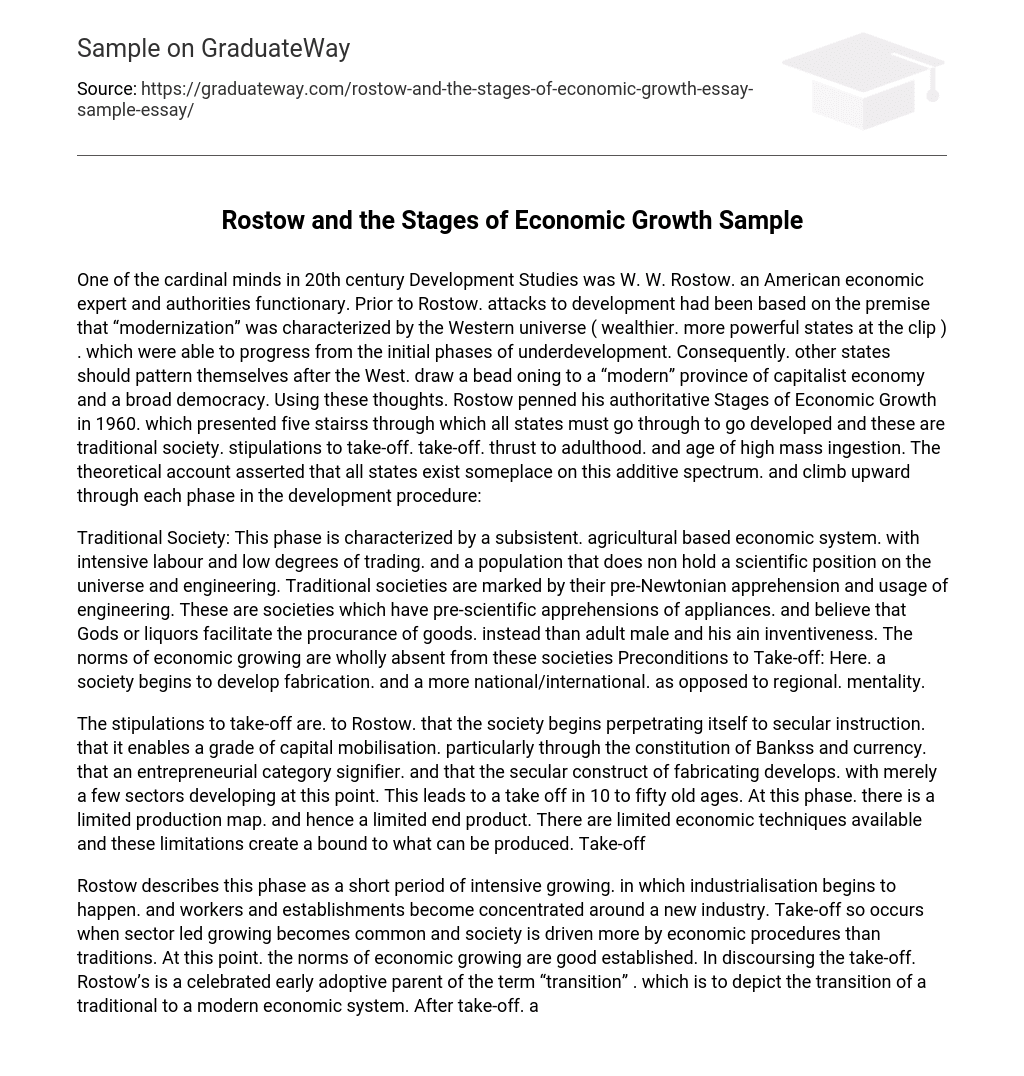One of the cardinal minds in 20th century Development Studies was W. W. Rostow. an American economic expert and authorities functionary. Prior to Rostow. attacks to development had been based on the premise that “modernization” was characterized by the Western universe ( wealthier. more powerful states at the clip ) . which were able to progress from the initial phases of underdevelopment. Consequently. other states should pattern themselves after the West. draw a bead oning to a “modern” province of capitalist economy and a broad democracy. Using these thoughts. Rostow penned his authoritative Stages of Economic Growth in 1960. which presented five stairss through which all states must go through to go developed and these are traditional society. stipulations to take-off. take-off. thrust to adulthood. and age of high mass ingestion. The theoretical account asserted that all states exist someplace on this additive spectrum. and climb upward through each phase in the development procedure:
Traditional Society: This phase is characterized by a subsistent. agricultural based economic system. with intensive labour and low degrees of trading. and a population that does non hold a scientific position on the universe and engineering. Traditional societies are marked by their pre-Newtonian apprehension and usage of engineering. These are societies which have pre-scientific apprehensions of appliances. and believe that Gods or liquors facilitate the procurance of goods. instead than adult male and his ain inventiveness. The norms of economic growing are wholly absent from these societies Preconditions to Take-off: Here. a society begins to develop fabrication. and a more national/international. as opposed to regional. mentality.
The stipulations to take-off are. to Rostow. that the society begins perpetrating itself to secular instruction. that it enables a grade of capital mobilisation. particularly through the constitution of Bankss and currency. that an entrepreneurial category signifier. and that the secular construct of fabricating develops. with merely a few sectors developing at this point. This leads to a take off in 10 to fifty old ages. At this phase. there is a limited production map. and hence a limited end product. There are limited economic techniques available and these limitations create a bound to what can be produced. Take-off
Rostow describes this phase as a short period of intensive growing. in which industrialisation begins to happen. and workers and establishments become concentrated around a new industry. Take-off so occurs when sector led growing becomes common and society is driven more by economic procedures than traditions. At this point. the norms of economic growing are good established. In discoursing the take-off. Rostow’s is a celebrated early adoptive parent of the term “transition” . which is to depict the transition of a traditional to a modern economic system. After take-off. a state will take every bit long as 50 to one hundred old ages to make adulthood. Drive to Maturity: This phase takes topographic point over a long period of clip. as criterions of life rise. usage of engineering additions. and the national economic system grows and diversifies. The sectors of the economic system which lead ab initio begin to level off. while other sectors begin to take off. This diverseness leads to greatly decreased rates of poorness and lifting criterions of life. as the society no longer needs to give its comfort in order to beef up certain sectors. Age of High Mass Consumption: At the clip of composing. Rostow believed that Western states. most notably the United States. occupied this last “developed” phase.
Here. a country’s economic system flourishes in a capitalist system. characterized by mass production and consumerism. The age of high mass ingestion besides refers to the period of modern-day comfort afforded many western states. wherein consumers concentrate on lasting goods. and barely retrieve the subsistence concerns of old phases. Rostow uses the Buddenbrooks kineticss metaphor to depict this alteration in attitude. In Thomas Mann’s novel. Buddenbrooks. a household is chronicled for three coevalss. The first coevals is interested in economic development. the 2nd in its place in society. The 3rd. already holding money and prestigiousness. concerns itself with the humanistic disciplines and music. distressing small about those old. earthly concerns. So excessively. in the age of high mass ingestion. a society is able to take between concentrating on military and security issues. on equality and public assistance issues. or on developing great luxuries for its upper category. Decision
Each state in this place chooses its ain balance between these three ends. The phases merely show which stage the state is traveling through and besides shows what is expected of it. .





